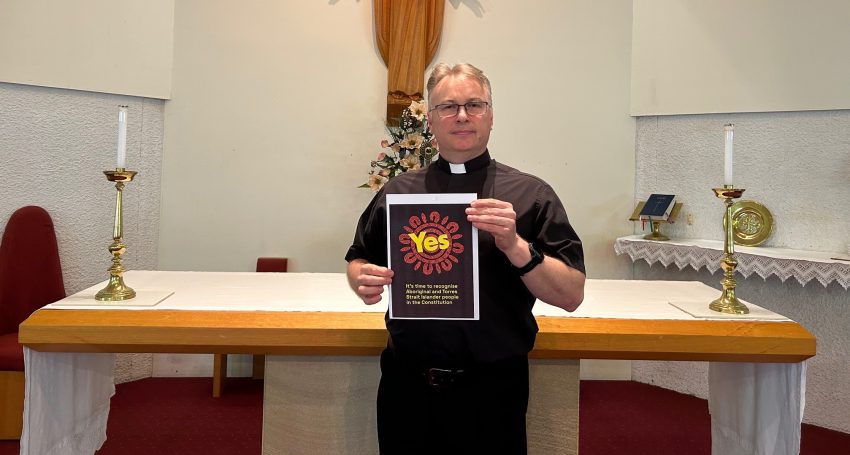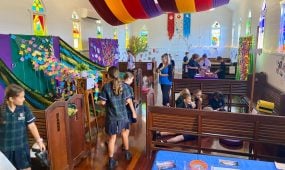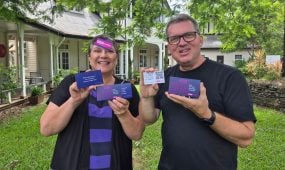Why I am voting "yes" in the referendum: The Rev’d Cameron Freese
Features
“The Aboriginal and Torres Strait Islander peoples I know are pragmatic, so it makes sense that they wish to be recognised in the Constitution through an advisory body — a Voice. The Voice’s design principles show that the non-binding independent advice will come from the grassroots enabling Parliament and Government to function more effectively. In my book, that can only be a good thing,” says The Rev’d Cameron Freese

Story Timeline
- Why I support constitutional recognition through an Aboriginal and Torres Strait Islander Voice to Parliament: Aunty Dr Rose Elu
- Why I am voting “yes” in the referendum: Sue Cooke
- Why I am voting “yes” in the referendum: The Ven. Geoff Hoyte
- Why I am voting “yes” in the referendum: Phyllis Marsh
- Why I am voting “yes” in the referendum: Bishop Daniel Abot
- Why I am voting “yes” in the referendum: Adrian Malone
- Why I am voting “yes” in the referendum: The Rev’d Rick Gummow
- Why I am voting “yes” in the referendum: Uncle Milton Walit
- Why I am voting “yes” in the referendum: Marilyn Wright
- Why I am voting “yes” in the referendum: Barry Kuskopf
- Why I am voting “yes” in the referendum: Aiden Wu
- Why I am voting “yes” in the referendum: Reg Dean
- Why I am voting “yes” in the referendum: Jill Rylatt
I was watching Back in Time For The Corner Shop on ABC iview the other night. Through the lens of a corner shop, the “living-history” television series charts the socio-economic and historical changes that shaped how Australians shopped, lived and connected between the 1850s and the 1990s.
During the episode that focused on the 1960s, the 1967 referendum was a key topic of conversation. As they did at the time, the shop owners (the Ferrone family) hand out “Vote yes” flyers to customers and passersby.
Advertisement
A prominent Wiradjuri leader visits the store to talk with the Ferrones about the impact of the 1967 Referendum on Aboriginal and Torres Strait Islander Australians. What struck me about their conversation is the observation that “we knew how many sheep there were in this country, but we didn’t know how many Aboriginal people there were”.
The successful 1967 Referendum was about two things. Firstly, it was about Aboriginal and Torres Strait Islander peoples being counted in the Census as part of the national population. It really hit me while watching this episode that at the time livestock was valued more than Indigenous peoples.
Secondly, the 1967 Referendum was about the Commonwealth being able to make laws for Aboriginal and Torres Strait Islander peoples, which led to the dismantling of harmful state-based policies, such as the forced removal of children (known as the “Stolen Generations”) and the requirement that they get permission to enter or exit reserves, seek employment or marry.
When I reflect on the 1967 Referendum, which has the highest “yes” vote of any referendum, I think about how Australian voters came together in support of human dignity and decency.
Advertisement
This year’s referendum is the next step. Supporting the continuity of human dignity is important to me, so I’ll be voting “yes” out of respect. I respect Aboriginal and Torres Strait Islander peoples for being the First Peoples and for caring for these lands for thousands of years, and I want to see their legacy recognised in our nation’s birth certificate — our Constitution.
The Aboriginal and Torres Strait Islander peoples I know are pragmatic, so it makes sense that they wish to be recognised in the Constitution through an advisory body — a Voice. The Voice’s design principles show that the non-binding independent advice will come from the grassroots enabling Parliament and Government to function more effectively. In my book, that can only be a good thing.
Editor’s note: The Anglican Church Southern Queensland supports the Anglican Board of Mission’s 2017 call for “a Constitutionally Entrenched First Nations Voice”. The ACSQ also supports the Anglican Church of Australia’s Joint Affirmation of Faith and Justice with First Nations Peoples (carried by affirmation at General Synod, Oct 2007), and seeks practical ways to do so, including our association with Reconciliation Australia and the prescribed process of Reconciliation Action Plans.
Editor’s note: 21/07/2023: This anglican focus feature, written by The Ven. Geoff Hoyte, The Rev’d Michael Stalley and The Rev’d Rick Gummow, provides a timeline showing how the ACSQ came to its position on recognising Aboriginal and Torres Strait Islander peoples in the Constitution through a Voice to Parliament.





